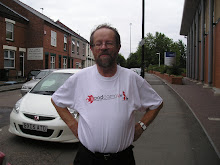 We’ve been to Oxford today [Monday], in spite of having to struggle our way through yet another traffic jam. The town is everything you’d ever heard about and much more. It’s full of delightful buildings from a number of eras, and decoration abounds. Once you’re in the centre you can’t help but stumble over history at every point. We sat for some time in a church - the University Church of St Mary Virgin, if I remember rightly - where John and Charles Wesley preached, and where John Henry Newman rattled the rafters.
We’ve been to Oxford today [Monday], in spite of having to struggle our way through yet another traffic jam. The town is everything you’d ever heard about and much more. It’s full of delightful buildings from a number of eras, and decoration abounds. Once you’re in the centre you can’t help but stumble over history at every point. We sat for some time in a church - the University Church of St Mary Virgin, if I remember rightly - where John and Charles Wesley preached, and where John Henry Newman rattled the rafters.We went to a free exhibition of books related to Plutarch and Dante and Boccaccio. Some of the books had belonged to Plutarch himself, and had his notes very tidily written in the margins. (Making comments in the margins is nothing new, obviously.) Some of the books had the most glorious paintings alongside the text (and more comments from the owners). The colour was as fresh as the day it was done. There were all sorts of editions of Dante’s work, and a number of pictures and cartoons and drawings connected to that great tryptich. (I once had an edition of Dorothy Sayer’s translation of the book, which I think I must have left behind last time I was in England. Unfortunately, along with a trunkful of other books that we left in the care of a family member, it’s never been seen again.)
Oxford is curiously busy in certain streets - chock full of mostly young people speaking other languages - and then suddenly quiet in another street. Bicycles abound (their riders inconsistent in their use of helmets) and students are everywhere, debating on the street, striding along listening to ipods, walking seriously from one famous building to another, or laughing and having the time of the lives in a place they can barely comprehend the history of. Who can? Trying to be aware of the fact of the famous people who’ve trod these streets is nearly impossible; even in the church I could only think that the people listening to Wesley and Newman were no different from me: they ate, drank and slept as I do. They were privileged to hear men I’ve never heard, but I wonder if they considered it a privilege at the time.
 In these church buildings you keep walking over memorial stones set in the floor. I’m not sure how many people are normally buried beneath these stones, or whether anyone is at all, but the memorials are a distinct reminder of our own mortality. One day, in a sense, people will walk over our graves too, careless as to who we are and what we did or didn’t do, incapable of appreciating our tiny role in the history of the world. It’s awfully sobering. Thank God we matter to God and to those close to us, otherwise it would be very depressing.
In these church buildings you keep walking over memorial stones set in the floor. I’m not sure how many people are normally buried beneath these stones, or whether anyone is at all, but the memorials are a distinct reminder of our own mortality. One day, in a sense, people will walk over our graves too, careless as to who we are and what we did or didn’t do, incapable of appreciating our tiny role in the history of the world. It’s awfully sobering. Thank God we matter to God and to those close to us, otherwise it would be very depressing.

No comments:
Post a Comment